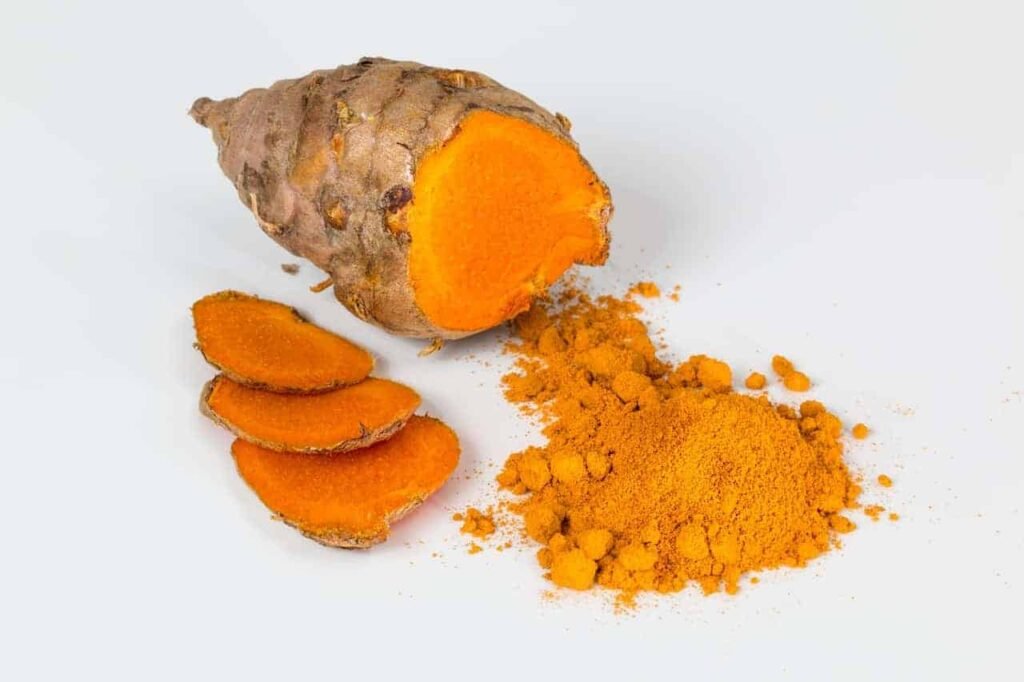Can Dogs Eat Turmeric? Surprising Benefits of Turmeric For Dogs

Turmeric has been an aged-long medicinal food for humans and it’s almost natural to ask, Can dogs eat Turmeric? The quick answer is “Yes, dogs can eat turmeric.” However, there is more to just giving your dogs turmeric to eat.
In this article, we will take a deep dive into the health benefits of turmeric for dogs as well as how to prepare and give turmeric to dogs. Also, we will be looking at some things to consider when buying turmeric and where to buy turmeric for your canine friends.
Even though turmeric has some great health benefits for dogs, it may have side effects on some dogs. So, this article will explain how much turmeric your dogs should have and how to make homemade turmeric treats to ensure that there are no harmful ingredients added. It’s going to be an exciting read, so let’s get started immediately.
Can Dogs Eat Turmeric?
Yes, dogs can eat turmeric and it is best to give them in small doses. Research shows that turmeric contains an active compound called curcumin, which has antioxidant and anti-inflammatory properties. These properties can potentially benefit dogs by promoting joint health, providing pain relief, supporting the immune system, promoting digestive health, and supporting heart health.
While it is safe for dogs to eat turmeric, you still need to take caution as too much turmeric can also cause digestive upset in dogs or interact with certain medications and reduce its effects.
Is Turmeric Good for Dogs?
Yes, turmeric is very safe for dogs to eat. A lot of research works have been done on the health benefits of turmeric for humans, however, the few done for dogs show that dogs indeed benefit from eating turmeric.
Also, it’s very uncommon for dogs to be allergic to turmeric. However, when you give your dog a new food like turmeric, it’s important to start with a small amount to see how their stomach reacts. If you give them too much, it might upset their tummy. But if you use it in the right amount, turmeric can be good for their digestion.
Read this article about the 13 Most Common Food Allergens for Dogs

Can All Dogs Have Turmeric?
While turmeric is generally safe for dogs, it’s important to note that not all dogs may tolerate it well. Although, very rare, some dogs may have sensitivities or allergies to turmeric, which can cause adverse reactions. Additionally, certain health conditions or medications may interact with turmeric.
It is always recommended to consult with a veterinarian before introducing turmeric or any new supplement into your dog’s diet. Your vet can evaluate your dog’s individual health needs and determine if turmeric is suitable for them. They can also guide you on the appropriate dosage and help monitor your dog’s response to ensure their safety and well-being.
Remember, each dog is unique, and what may be safe for one dog may not be suitable for another. Prioritizing your dog’s health and seeking professional advice will help you make informed decisions about incorporating turmeric into your dog’s diet.
What Are the Health Benefits of Turmeric for Dogs?
Turmeric has several health benefits for dogs. Let’s explore them:
- Promote joint health: Turmeric can help promote healthy joints in dogs, which is especially beneficial for older dogs or those with joint issues. You can also achieve this by giving dogs collagen treats.
- Provide pain relief: Turmeric contains curcumin, which has natural anti-inflammatory properties that can help reduce pain and discomfort in dogs, such as from arthritis or other inflammatory conditions.
- Support the immune system: Turmeric contains antioxidants that support the immune system, helping dogs stay healthy and fight off infections.
- Promote digestive health: Turmeric can aid digestion and promote a healthy digestive system in dogs, reducing issues like bloating or indigestion.
- Support the heart: Turmeric may help support a healthy heart in dogs by improving blood circulation and reducing the risk of heart-related problems.
Read also; Can Dogs Eat Probiotics For Humans? A Comprehensive Guide
Are There Any Side Effects of Turmeric for Dogs?
While turmeric can provide health benefits for dogs, it’s important to be aware of potential side effects. Here are a few things to consider:
- Upset Stomach: Giving too much turmeric to dogs can sometimes cause digestive upset, leading to symptoms like diarrhea or vomiting. It’s important to introduce turmeric gradually and in appropriate amounts.
- Allergic reactions: Although rare, dogs can develop allergies to turmeric. Watch out for signs such as itching, rashes, or difficulty breathing. If you notice any of these symptoms, discontinue turmeric and consult a veterinarian.
- Interaction with Medications: Turmeric can interact with certain medications, such as blood thinners. If your dog is taking any medications, it’s crucial to discuss the use of turmeric with your vet to prevent any potential interactions.
- Staining: Turmeric has a vibrant yellow-orange color that can stain fur, fabrics, or surfaces. Be cautious when using turmeric in homemade dog treats or paste to avoid staining.

How to Effectively Supplement Turmeric in Dog Food
Supplementing turmeric in your dog’s food can be done effectively by following these steps:
1. Start with a small amount:
Begin by introducing a small amount of turmeric to your dog’s food. This allows their system to adjust and helps you assess their tolerance. A recommended starting dose is 1/8 to 1/4 teaspoon per day, depending on your dog’s size.
2. Mix with healthy fats:
Turmeric is better absorbed by the body when combined with healthy fats. You can mix turmeric powder with a small amount of coconut oil, olive oil, or fish oil before adding it to your dog’s food. This enhances the bioavailability of turmeric’s active compounds.
3. Opt for freshly ground turmeric:
Freshly ground turmeric root provides the highest potency and quality. If using fresh turmeric, grind it into a fine powder using a spice grinder or mortar and pestle. This allows for better absorption and utilization of the active compounds.
4. Add black pepper:
Black pepper contains piperine, a compound that enhances the absorption of curcumin, the main active ingredient in turmeric. Sprinkle a small amount of freshly ground black pepper along with the turmeric to enhance its effectiveness.
5. Consider cooked or heated preparations:
Heating turmeric in food can increase its bioavailability. You can lightly cook or heat the turmeric mixture before adding it to your dog’s food. Avoid excessive heat, as very high temperatures may degrade the beneficial properties.
6. Monitor your dog’s response:
Observe your dog for any adverse reactions or digestive upset after introducing turmeric. If they tolerate it well, you can gradually increase the amount over time, following the guidance of a veterinarian.

How to Give Turmeric to Dogs
When it comes to giving turmeric to dogs, there are a few ways you can do it:
- Turmeric Paste: You can make a turmeric paste by mixing turmeric powder with a small amount of water or coconut oil. This paste can be added to your dog’s food. Start with a small amount and gradually increase if your dog tolerates it well.
- Homemade Turmeric Treats: Another option is to add turmeric as an ingredient in homemade dog treats. You can find recipes online that include turmeric as an ingredient. Ensure that the treats are safe for dogs and follow the recipe instructions carefully.
- Commercial Turmeric Supplements: There are also commercial turmeric supplements available specifically made for dogs. These supplements come in different forms such as chews or capsules. Follow the recommended dosage provided by the manufacturer or consult your veterinarian for guidance.
Are There Turmeric Supplements for Dogs? Can Dogs Take Turmeric Supplements?
Yes, there are turmeric supplements specifically formulated for dogs. These supplements are designed to provide the health benefits of turmeric in a convenient and concentrated form. Turmeric supplements for dogs often come in the form of capsules, tablets, or chewable treats.
Dogs can take turmeric supplements, but it’s important to follow the recommended dosage guidelines provided by the manufacturer or as advised by a veterinarian. The dosage will typically depend on the size and weight of your dog. It’s crucial to use supplements that are specifically made for dogs, as the dosage and formulation can vary compared to those intended for humans.
Where to Buy Turmeric Supplements for Dogs?
Turmeric supplements for dogs can be purchased from various sources. Here are some options for where you can buy turmeric for dogs:
- Pet Supply Stores: Visit your local pet supply stores or pet specialty stores. They often carry a range of dog supplements and health products, including turmeric specifically formulated for dogs.
- Veterinary Clinics: Check with your veterinarian or veterinary clinic. They may carry turmeric or be able to recommend trusted brands or suppliers.
- Online Retailers: Explore reputable online retailers that specialize in pet products. They often have a wide selection of turmeric for dogs, including different formulations such as powder, capsules, or treats.
- Health Food Stores: Some health food stores carry pet-friendly turmeric products. Check with your local health food store to see if they carry turmeric for dogs or if they can recommend any nearby stores that do.
- Direct from Manufacturers: Some companies that produce turmeric supplements or products for dogs have their own online stores. You can purchase directly from them, ensuring the authenticity and quality of the product.

How Much Turmeric Should Dogs Have?
The recommended amounts of turmeric for dogs can vary based on their size. Here is a general guideline for starting doses:
- Turmeric dosage for small dogs: For small dogs, it is recommended to start with approximately 1/4 teaspoon of turmeric per day.
- Turmeric dosage for medium dogs: Medium-sized dogs can begin with around 1/2 teaspoon of turmeric per day.
- Turmeric dosage for large dogs: For larger dogs, it is suggested to start with about 3/4 teaspoon of turmeric per day.
- Turmeric dosage for giant dogs: Giant breed dogs can begin with approximately 1 teaspoon of turmeric per day.
Not only does the dosage of turmeric to give dogs vary with the size of the dog but it also varies with the weight and overall health of the dog. Hence it’s important to always give turmeric to dogs in moderation. Here are some general guidelines:
- Start with a small amount: Begin by introducing a small quantity of turmeric to your dog’s diet. This can be as little as 1/8 to 1/4 teaspoon per day.
- Monitor your dog’s response: Observe how your dog reacts to the turmeric. Look for any signs of stomach upset or allergic reactions. If your dog tolerates it well, you may gradually increase the amount over time.
- Consult with a veterinarian: It’s highly recommended to consult with your veterinarian before giving turmeric to your dog. They can provide specific guidance based on your dog’s individual needs and health conditions.
- Consider turmeric supplements: If you prefer to use turmeric supplements specifically formulated for dogs, follow the dosage instructions provided by the manufacturer. These products often have recommended serving sizes based on the dog’s weight.
What Other Anti-Inflammatory Options Are Available for Dogs?
There are several other anti-inflammatory options available for dogs besides turmeric. Here are a few examples:
- Fish Oil: Fish oil, rich in omega-3 fatty acids, can help reduce inflammation in dogs. It is available in liquid or capsule form and can be added to their food.
- Green-Lipped Mussel: Green-lipped mussel is a shellfish that contains natural anti-inflammatory compounds. It is available as a supplement and can help support joint health in dogs.
- Bromelain: Bromelain is an enzyme found in pineapples that has anti-inflammatory properties. It can be given to dogs in supplement form, but it’s important to consult with a veterinarian for the appropriate dosage.
- CBD Oil: Cannabidiol (CBD) oil derived from hemp or cannabis plants can have anti-inflammatory effects. However, it’s crucial to consult with a veterinarian and ensure that the CBD oil is specifically formulated for dogs.
- Herbal Remedies: Certain herbs like ginger, boswellia, and licorice root have anti-inflammatory properties and can be used in combination with other treatments under the guidance of a veterinarian.
How to Make Homemade Turmeric Dog Treats
Making homemade turmeric dog treats can be a fun and healthy way to incorporate turmeric into your dog’s diet. Here’s a simple recipe to make homemade turmeric dog treats:
Ingredients for making homemade turmeric treat:
- 1 cup of whole wheat flour (or flour of your choice)
- 1/4 cup of turmeric powder
- 1/4 cup of peanut butter (make sure it does not contain xylitol, as it can be toxic to dogs)
- 1/4 cup of water
- Optional: additional ingredients like cinnamon or honey for added flavor
Instructions for making homemade turmeric treat:
- Preheat your oven to 350°F (175°C) and line a baking sheet with parchment paper.
- In a mixing bowl, combine the whole wheat flour and turmeric powder. If desired, you can also add other dog-friendly spices like cinnamon for added flavor.
- In a separate bowl, mix the peanut butter and water until well combined. If the mixture is too thick, you can add a bit more water to achieve a smooth consistency.
- Gradually add the peanut butter mixture to the dry ingredients, stirring well until a dough forms. You may need to use your hands to knead the dough together.
- On a lightly floured surface, roll out the dough to your desired thickness. Use cookie cutters to cut out shapes or simply use a knife to create small squares or rectangles.
- Place the treats onto the prepared baking sheet and bake in the preheated oven for about 15-20 minutes or until the treats are golden brown and firm.
- Remove from the oven and allow the treats to cool completely before offering them to your dog.
Remember to store the homemade turmeric dog treats in an airtight container in a cool, dry place. Turmeric treats can be given to your dog in moderation as part of a balanced diet but must not replace their food.
Frequently Asked Questions
Can I give my dog human turmeric capsules?
It’s not recommended to give dogs human turmeric capsules as they may contain different ingredients or concentrations that could be harmful. Look for turmeric supplements specifically made for dogs to ensure their safety.
Can dogs eat fresh turmeric?
Yes, dogs can eat fresh turmeric in moderation. Fresh turmeric can provide potential health benefits, but it’s important to introduce it slowly and in small amounts to monitor any adverse reactions.
Can dogs eat turmeric powder?
Yes, dogs can eat turmeric powder in moderation. Turmeric powder can be added to their food to provide potential health benefits, but start with small quantities and monitor for any digestive issues.
Can dogs eat turmeric every day?
Occasional and moderate consumption of turmeric is generally safe for dogs. However, it’s best to introduce it gradually and observe how your dog responds before incorporating it into their daily routine.
Can dogs eat turmeric rice?
Turmeric rice can be given to dogs as an occasional treat in small amounts. Ensure that the rice is plain and free from any seasonings or ingredients that may be harmful to dogs.
How quickly does turmeric work for dogs?
The effectiveness of turmeric can vary based on the specific health condition. It may take some time to see noticeable results, so consistency is key. Monitor your dog’s progress and make adjustments as needed.
What can I mix turmeric with for my dog?
Turmeric powder for dogs can be mixed with either coconut or olive oil and ground pepper to create a paste that can be added to your dog’s food. It’s best to use the paste with wet food. The paste is good for up to two weeks.
Conclusion
While turmeric holds potential health benefits for dogs, it’s essential to approach its use with caution. Remember, every dog is unique, and what works for one may not work for another. It’s always advisable to consult with your veterinarian before introducing any new food or supplement into your dog’s diet.
Furthermore, it’s important to consider turmeric as part of a holistic approach to your dog’s well-being. A balanced diet, regular exercise, and proper veterinary care remain the cornerstones of their overall health. Keep an open mind and stay informed about new studies and findings in the field of canine nutrition.
Ultimately, the decision to incorporate turmeric into your dog’s diet is yours to make. By doing your research, seeking professional advice, and carefully observing your furry friend’s response, you can make informed choices that contribute to their happiness and well-being.

Read Other Dog Food Resources
- Can Dogs Eat Yellow Squash? A Good Vegetable or Not?
- Can Dogs Eat Rawhide Chews? Is Rawhide Chews Bad For Dogs?
- Can Dogs Eat Fig Newtons? Pure Facts You Need To Know
- Can Dogs Eat Salami? All You Need To Know
- Can Dogs Eat Quail Eggs?
References;
- Purina – Benefits of Turmeric for Dogs
- Great Pet Care – Turmeric for Dogs: Benefits and Uses
- Dogs Naturally – Turmeric For Dogs: 5 Surprising Health Benefits
- Canine Journal – Turmeric For Dogs: Benefits, How To Use, Side Effects & More





